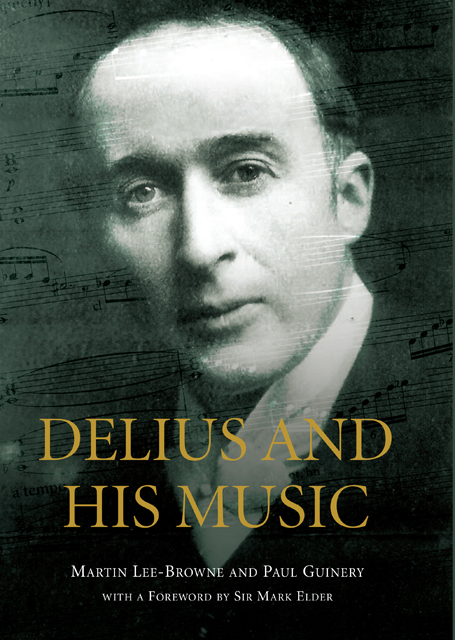Book contents
- Frontmatter
- Contents
- List of Illustrations
- List of Sources and Abbreviations
- Foreword by Sir Mark Elder, CBE
- Preface
- Chapter 1 1862–1888 Youth
- Chapter 2 1888–1892 The Young Composer in Paris
- Chapter 3 1893–1901 Coming to Maturity
- Chapter 4 1902–1905 The Great Noontide and Beecham
- Chapter 5 1906–1910 Acceptance and Friends
- Chapter 6 1911–1914 Inspiration Unabated
- Chapter 7 1915–1918 Winding Down
- Chapter 8 1919–1934 Fenby and the Last Years
- Chapter 9 The Songs
- Chapter 10 1934 and After
- Appendix 1 Delius’s Works in Chronological Order
- Appendix 2 Delius’s Diploma and Reports from The Leipzig Conservatorium
- Appendix 3 Programmes for the 1929 and 1946 Delius Festivals
- Selected Further Reading
- Index
Chapter 3 - 1893–1901 Coming to Maturity
Published online by Cambridge University Press: 24 February 2023
- Frontmatter
- Contents
- List of Illustrations
- List of Sources and Abbreviations
- Foreword by Sir Mark Elder, CBE
- Preface
- Chapter 1 1862–1888 Youth
- Chapter 2 1888–1892 The Young Composer in Paris
- Chapter 3 1893–1901 Coming to Maturity
- Chapter 4 1902–1905 The Great Noontide and Beecham
- Chapter 5 1906–1910 Acceptance and Friends
- Chapter 6 1911–1914 Inspiration Unabated
- Chapter 7 1915–1918 Winding Down
- Chapter 8 1919–1934 Fenby and the Last Years
- Chapter 9 The Songs
- Chapter 10 1934 and After
- Appendix 1 Delius’s Works in Chronological Order
- Appendix 2 Delius’s Diploma and Reports from The Leipzig Conservatorium
- Appendix 3 Programmes for the 1929 and 1946 Delius Festivals
- Selected Further Reading
- Index
Summary
During these next eight years, Delius wrote four operas, a piano concerto, six orchestral works and fifteen songs – and by the end of the period he had become a mature composer, with his own utterly distinctive style. However, his great problem – admittedly one that almost all aspiring composers face at the start of their careers – was actually getting anything played or published. There had been the ad hoc performance of Florida at Leipzig in 1888, and the two professional ones of On the Mountains in Norway in 1891 and Monte Carlo in 1894 – but that was that, and, notwithstanding the encouragement of a few friends, it would not be until 1897 that another note of Delius’s was heard in public. The principal reason for the lack of performances can only have been that the mainly salon-type, ‘easy-listening’, music that Delius was still writing in the early 1890s simply stood little chance of acceptance by the major conductors, publishing houses and concert promoters, when by this time audiences in German concert halls and opera houses had already heard works such as Parsifal (1882), Debussy’s L’ Enfant prodigue and Bruckner’s Symphony no. 7 (1884), and Strauss’s Tod und Verklärung (1890 – the same year that Delius began his Suite for violin and orchestra). Nevertheless he persevered.
The musical public’s taste in songs, on the other hand, had not advanced anything like as much as that for orchestral music, and so publishers were more willing to take them. In fact, Delius had done reasonably well. Augener Limited of London had issued Fünf Lieder (aus dem Norwegischen) in 1890 and then Three Songs, the Words by Shelley and Sieben Lieder (aus dem Norwegischen) in 1892. In 1896, ‘Le Ciel est par-dessus le toit’ (one of the Deux Mélodies with words by Paul Verlaine) appeared in a French magazine; then, in the same year, L. Grus Fils of Paris produced a book of Cinq Chansons, musique de Fritz Delius (the 1888 ‘O schneller mein Ross’, two of the Sieben Lieder, one of the Shelley songs, and the second of the Deux Mélodies).
Away from his desk, Delius was torn between the ‘high solitudes’ of Norway with a few good friends, and the lively café life of Montparnasse with many.
- Type
- Chapter
- Information
- Delius and his Music , pp. 59 - 134Publisher: Boydell & BrewerPrint publication year: 2014



